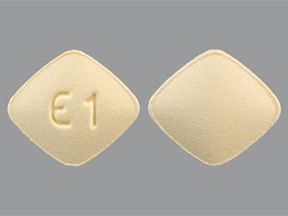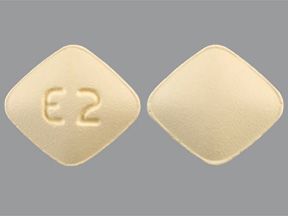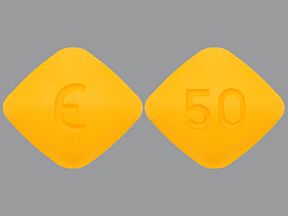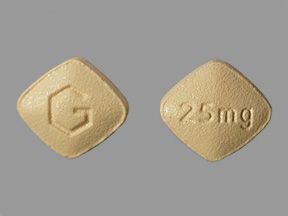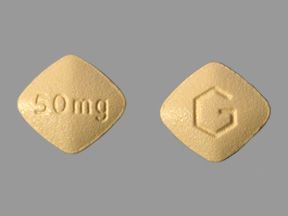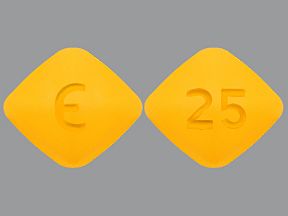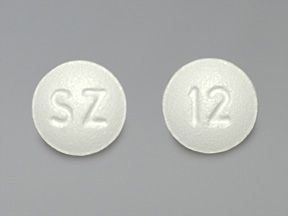Highlights for eplerenone
- Eplerenone oral tablet is available as a generic drug and a brand-name drug. Brand name: Inspra.
- Eplerenone comes only as a tablet you take by mouth.
- Eplerenone oral tablet is used to treat hypertension (high blood pressure), and heart failure after you have a heart attack.
- High potassium warning: This drug may raise the potassium levels in your blood. Your doctor will check your potassium levels while you take eplerenone. You shouldn’t take this drug if you:
- have a high potassium level
- take a blood pressure drug that affects your potassium level
- take potassium supplements
- have poor kidney function
Eplerenone is a prescription drug. It comes as an oral tablet.
Eplerenone oral tablet is available as the brand-named drug Inspra. It’s also available as a generic drug. Generic drugs usually cost less than the brand-name version. In some cases, they may not be available in every strength or form as the brand-name drug.
Eplerenone may be taken as part of a combination therapy. This means you may need to take it with other medications.
Why it’s used
Eplerenone is used to treat high blood pressure. Medications that lower blood pressure reduce your chance of having a stroke or heart attack.
Eplerenone is also used to help treat heart failure after a heart attack.
How it works
Eplerenone belongs to a class of drugs called aldosterone antagonists. A class of drugs is a group of medications that work in a similar way. These drugs are often used to treat similar conditions.
Eplerenone works by interfering with the activity of a steroid in your body called aldosterone. Aldosterone acts to increase the amount of sodium and water you retain. This increased sodium and water can cause high blood pressure, which can in turn cause heart failure.
Eplerenone blocks aldosterone’s ability to increase the amount of sodium and water in your body. It allows more water and sodium to leave your body.
Eplerenone oral tablet may cause drowsiness as well as other side effects.
More common side effects
The more common side effects that can occur with eplerenone include:
- dizziness
- diarrhea
- coughing
- flu-like symptoms, such as fever and body aches
- tiredness
- gynecomastia (breast growth in men)
If these effects are mild, they may go away within a few days or a couple of weeks. If they’re more severe or don’t go away, talk to your doctor or pharmacist.
Serious side effects
Call your doctor right away if you have serious side effects. Call 911 if your symptoms feel life-threatening or if you think you’re having a medical emergency. Serious side effects and their symptoms can include the following:
- Kidney problems. Symptoms can include:
- dehydration
- fatigue
- swelling of your legs
- confusion
- decrease in urination
- Hyperkalemia (high potassium levels in your blood. Symptoms can include:
- muscle weakness
- tiredness
- irregular heartbeat
- tingling
- nausea
Disclaimer: Our goal is to provide you with the most relevant and current information. However, because drugs affect each person differently, we cannot guarantee that this information includes all possible side effects. This information is not a substitute for medical advice. Always discuss possible side effects with a healthcare provider who knows your medical history.
Eplerenone oral tablet can interact with other medications, vitamins, or herbs you may be taking. An interaction is when a substance changes the way a drug works. This can be harmful or prevent the drug from working well.
To help avoid interactions, your doctor should manage all of your medications carefully. Be sure to tell your doctor about all medications, vitamins, or herbs you’re taking. To find out how this drug might interact with something else you’re taking, talk to your doctor or pharmacist.
Examples of drugs that can cause interactions with eplerenone are listed below.
Antibiotics
Taking antibiotics with eplerenone can increase the levels of eplerenone in your body. This may cause more side effects. Examples of these drugs include:
- clarithromycin
- erythromycin
Antidepressant drug
Taking nefazodone with eplerenone can increase the levels of eplerenone in your body. This may cause more side effects.
Antifungal drugs
Taking antifungal drugs with eplerenone can increase the levels of eplerenone in your body. This may cause more side effects. Examples of these drugs include:
- itraconazole
- ketoconazole
- fluconazole
Antiretroviral drugs
Taking eplerenone with drugs called antiretrovirals can increase the levels of eplerenone in your body. This may cause more side effects. Examples of these drugs include:
- nelfinavir
- ritonavir
- saquinavir
High blood pressure drugs
Taking eplerenone with drugs to treat high blood pressure can increase your risk of high blood potassium and kidney problems. Examples of these drugs include:
- angiotensin receptor blockers, such as:
- candesartan
- eprosartan
- irbesartan
- losartan
- olmesartan
- telmisartan
- valsartan
- azilsartan
- angiotensin-converting enzyme (ACE) inhibitors, such as:
- benazepril
- captopril
- enalapril
- fosinopril
- lisinopril
- moexipril
- perindopril
- quinapril
- ramipril
- trandolapril
Mood stabilizer drug
Taking lithium with eplerenone may increase the effects of these medications. This may cause more side effects.
Pain drugs
Certain pain drugs called nonsteroidal anti-inflammatory drugs (NSAIDs) and COX-2 inhibitors can affect blood pressure lowering and increase potassium levels when taken with eplerenone. Examples of these drugs include:
- celecoxib, a COX-2 inhibitor
- NSAIDs such as:
- diclofenac
- ibuprofen
- indomethacin
- ketoprofen
- ketorolac
- meloxicam
- nabumetone
- naproxen
- piroxicam
- ibuprofen
- naproxen
Potassium-sparing diuretics
Medications called potassium-sparing diuretics can increase the levels of potassium in your body when taken with eplerenone. Examples of these drugs include:
- spironolactone
- amiloride
- triamterene
Potassium supplements
Potassium supplements can increase the potassium in your body when taken with eplerenone.
Disclaimer: Our goal is to provide you with the most relevant and current information. However, because drugs interact differently in each person, we cannot guarantee that this information includes all possible interactions. This information is not a substitute for medical advice. Always speak with your healthcare provider about possible interactions with all prescription drugs, vitamins, herbs and supplements, and over-the-counter drugs that you are taking.
This drug comes with several warnings.
Allergy warning
Eplerenone can cause a severe allergic reaction. Symptoms include:
- trouble breathing
- swelling of your throat or tongue
- hives
If you develop these symptoms, call 911 or go to the nearest emergency room.
Don’t take this drug again if you’ve ever had an allergic reaction to it. Taking it again could be fatal (cause death).
Food interaction warning
Eating grapefruit or drinking grapefruit juice can increase the amount of eplerenone in your body. Avoid consuming grapefruit products while taking this drug.
Warnings for people with certain health conditions
For people with kidney problems: You may have an increased risk of higher potassium levels in your blood. Your doctor will monitor your kidneys and potassium levels to make sure it’s okay for you to keep taking eplerenone.
For people with diabetes: You shouldn’t use eplerenone if you have diabetes and have protein in your urine. Doing so will put you at higher risk of developing hyperkalemia (high potassium levels). Symptoms of hyperkalemia include:
- muscle weakness
- exhaustion
- tingling
- nausea
For people with high blood pressure: If you have high blood pressure, you shouldn’t take this drug if you have certain other conditions. Tell your doctor if you have kidney problems, diabetes and protein in your urine, or if you’re taking potassium supplements.
Warnings for other groups
For pregnant women: Research in animals hasn’t shown a risk to the fetus when the mother takes the drug. However, animal studies don’t always predict the way humans would respond. Also, there haven’t been enough studies done in humans to show if the drug would pose a risk to a human fetus.
This drug should only be used in pregnancy if clearly needed. Talk to your doctor if you’re pregnant or planning to become pregnant.
For women who are breastfeeding: It isn’t known if eplerenone passes into breast milk. If it does, it may cause serious effects in a child who is breastfed. You and your doctor may need to decide if you’ll take eplerenone or breastfeed.
For seniors: Older adults may process drugs more slowly. A normal adult dosage may cause levels of this drug to be higher than normal in your body. If you’re a senior, you may need a lower dosage or a different dosage schedule.
For children: Eplerenone hasn’t been studied as treatment for heart failure in people younger than 18 years. For high blood pressure, eplerenone was found to be ineffective in children.
This dosage information is for eplerenone oral tablet. All possible dosages and forms may not be included here. Your dose, form, and how often you take it will depend on:
- your age
- the condition being treated
- the severity of your condition
- other medical conditions you have
- how you react to the first dose
Drug forms and strengths
Generic: Eplerenone
- Form: oral tablet
- Strengths: 25 mg, 50 mg
Brand: Inspra
- Form: oral tablet
- Strengths: 25 mg, 50 mg
Dosage for high blood pressure
Adult dosage (ages 18 to 64 years)
- Typical starting dosage: 50 mg taken once per day.
- Dosage increases: If needed, your doctor may increase your dosage to 50 mg taken twice per day.
Child dosage (ages 0–17 years)
There are no specific dosing recommendations for people younger than 18 years.
Senior dosage (ages 65 years and older)
Older adults may process drugs more slowly. A normal adult dosage may cause levels of this drug to be higher than normal in your body. If you’re a senior, you may need a lower dosage or a different dosage schedule.
Dosage for heart failure after a heart attack
Adult dosage (ages 18–64 years)
- Typical starting dosage: 25 mg taken once per day.
- Dosage increases: If needed, your doctor may increase your dosage to 50 mg taken once per day.
Child dosage (ages 0–17 years)
Eplerenone hasn’t been studied in children with heart failure and shouldn’t be used in people younger than 18 years.
Senior dosage (ages 65 years and older)
Older adults may process drugs more slowly. A normal adult dose may cause levels of this drug to be higher than normal in your body. If you’re a senior, you may need a lower dose or a different schedule.
Special dosage considerations
For people with kidney problems: Your doctor may stop your treatment with eplerenone if your kidney function is poor. Also, use of this drug may increase your risk of having too much potassium in your blood.
Disclaimer: Our goal is to provide you with the most relevant and current information. However, because drugs affect each person differently, we cannot guarantee that this list includes all possible dosages. This information is not a substitute for medical advice. Always speak with your doctor or pharmacist about dosages that are right for you.
Eplerenone is used for long-term treatment. It comes with serious risks if you don’t take it as prescribed.
If you stop taking the drug or don’t take it at all: If you don’t take the drug at all, your blood pressure will stay high. This will increase your risk of having a stroke or heart attack.
If you suddenly stop taking the drug, your blood pressure can spike (suddenly increase). This can raise your risk of a heart attack or stroke. Don’t stop taking eplerenone without talking to your doctor.
If you miss doses or don’t take it on schedule: You may not have good blood pressure control. This can increase your risk of a heart attack or a stroke.
If you take too much: If you take too much: You could have dangerous levels of the drug in your body. Taking too much eplerenone can lead to low blood pressure. It can also lead to high blood potassium levels, with symptoms that include:
- muscle weakness
- tiredness
- irregular heartbeat
- tingling
- nausea
If you think you’ve taken too much of this drug, call your doctor or seek guidance from the American Association of Poison Control Centers at 1-800-222-1222 or through their online tool. But if your symptoms are severe, call 911 or go to the nearest emergency room right away.
What to do if you miss a dose: If you forget to take your dose, take it as soon as you remember. If it’s just a few hours until the time for your next dose, wait and only take one dose at that time.
Never try to catch up by taking two doses at once. This could cause dangerous side effects.
How to tell if the drug is working: You’ll know if eplerenone is working when you check your blood pressure at home. If your blood pressure is at or below the goal your doctor set for you, the medication is working.
Keep these considerations in mind if your doctor prescribes eplerenone for you.
General
- Eplerenone may be taken with or without food.
- You can cut or crush the tablet.
Storage
- Store eplerenone at room temperature between 68°F and 77°F (20°C and 25°C).
- Don’t freeze eplerenone.
- Keep this drug away from light.
- Don’t store this medication in moist or damp areas, such as bathrooms.
Refills
A prescription for this medication is refillable. You should not need a new prescription for this medication to be refilled. Your doctor will write the number of refills authorized on your prescription.
Travel
When traveling with your medication:
- Always carry your medication with you. When flying, never put it into a checked bag. Keep it in your carry-on bag.
- Don’t worry about airport X-ray machines. They can’t harm your medication.
- You may need to show airport staff the pharmacy label for your medication. Always carry the original prescription-labeled container with you.
- Don’t put this medication in your car’s glove compartment or leave it in the car. Be sure to avoid doing this when the weather is very hot or very cold.
Self-management
You may need to check your blood pressure at home. If so, you should keep a log with the date, time of day, and your blood pressure readings. Bring this log with you to your doctor appointments.
If your doctor asks you to check your blood pressure at home, you’ll need to purchase a blood pressure monitor.
Clinical monitoring
During treatment with eplerenone, your doctor may need to check the following to see if the drug is working or is safe for you to keep taking:
- blood pressure
- liver function
- kidney function
- blood potassium
Hidden costs
If your doctor asks you to check your blood pressure at home, you’ll need a blood pressure monitor. These are available at most pharmacies.
Prior authorization
Many insurance companies require a prior authorization for this drug. This means your doctor will need to get approval from your insurance company before your insurance company will pay for the prescription.
There are other drugs available to treat your condition. Some may be better suited for you than others. Talk to your doctor about other drug options that may work for you.
Disclaimer: Healthline has made every effort to make certain that all information is factually correct, comprehensive, and up to date. However, this article should not be used as a substitute for the knowledge and expertise of a licensed healthcare professional. You should always consult your doctor or other healthcare professional before taking any medication. The drug information contained herein is subject to change and is not intended to cover all possible uses, directions, precautions, warnings, drug interactions, allergic reactions, or adverse effects. The absence of warnings or other information for a given drug does not indicate that the drug or drug combination is safe, effective, or appropriate for all patients or all specific uses.

